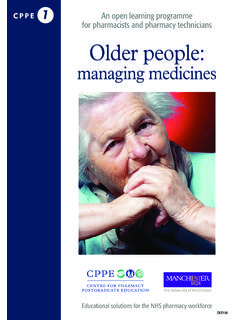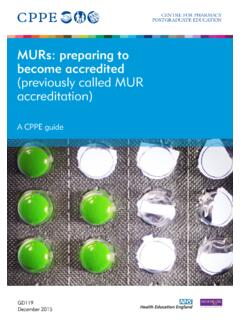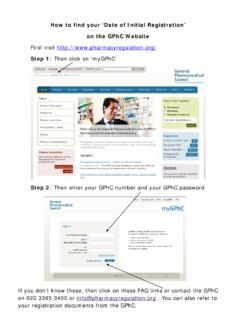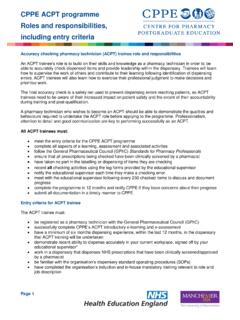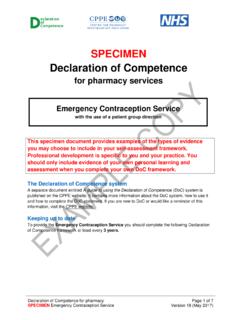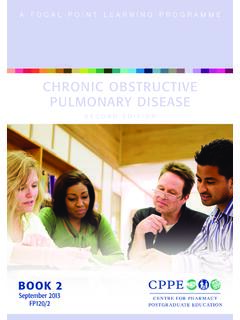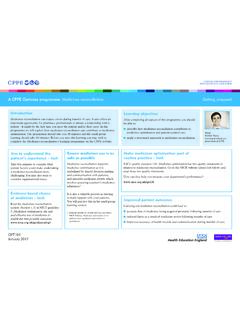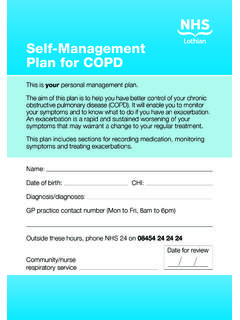Transcription of CHRONIC OBSTRUCTIVE PULMONARY DISEASE - CPPE
1 CENTRE FOR PHARMACYPOSTGRADUATE EDUCATIONS eptember 2013FP120/1 BOOK 1A FOCAl pOINT lEArNINg prOgrAmmE CHRONIC OBSTRUCTIVEPULMONARY DISEASESECOND EDITIONFP_COPD_Book1_FP_COPD_Book1 02/08/2013 11:50 Page 1focal pointCOPD Book 12 Content contributorsHelen Marlow, pharmaceutical adviser, NHS England London region, external lecturer Kings College,University of London and managing director Managing Medicines LtdDr Helen Meynell, consultant pharmacist with an interest in respiratory and palliative medicine, Doncaster andBassetlaw Hospitals NHS foundation trustAlison Astles, tutor, CPPES amantha Scragg, tutor, CPPED iana Taylor, tutor, CPPECPPE programme developer Sarah Ridgway Green, regional manager, CPPER eviewersAnna Murphy, consultant respiratory pharmacist, University Hospitals of Leicester NHS trustDr Helen Meynell, consultant pharmacist with an interest in respiratory and palliative medicine, Doncaster andBassetlaw Hospitals NHS foundation trustVincent Mak, consultant physician in Integrated Respiratory Care.
2 Charing Cross Hospital and CentralLondon Community Healthcare and clinical director at Outer North West London Integrated Care ProgrammeCPPE reviewersAlison Astles, tutor, CPPEJan Douglas, regional manager, CPPEP iloted by Claire Hough, tutor, CPPEWe thank the developer, contributors and reviewers of the first edition of this have developed this learning programme to support your practice in this topic area. We recommend thatyou use it in combination with other established reference sources. If you are using it significantly after the dateof initial publication, then you should refer to current published evidence. CPPE does not accept responsibilityfor any errors or websites CPPE is not responsible for the content of any non-CPPE websites mentioned in this programme or for theaccuracy of any information to be found URLs were checked on 3 July names and trademarksCPPE acknowledges the following brand names and registered trademarks mentioned throughout thisprogramme: Ventolin , Salamol , Airomir , Bricanyl , Atimos , Oxis , Serevent , Atrovent , Spiriva ,Foradil , Onbrez , Eklira , Seretide , Seebri , Symbicort.
3 Published in September 2013 by the Centre for Pharmacy Postgraduate Education, Manchester PharmacySchool, University of Manchester, Oxford Road, Manchester, M13 9 & artwork by Gemini West LtdPrinted by Gemini Press Ltd Printed on FSC certified paper stocks using vegetable based inks. FP_COPD_Book1_FP_COPD_Book1 02/08/2013 11:50 Page 2focal pointCOPD Book 13 ContentsLearning with CPPE 4 About CPPE focal pointprogrammes 5 About this focal pointunit on CHRONIC OBSTRUCTIVE PULMONARY DISEASE ( copd ) 5 Learning objectives6 Useful resources8 Checklist for planning 9 Moving into focus 10 What do you want to learn? 11 Reading, practice points and talking points 12 Directing change 37 Checklist for action 39 References40FP_COPD_Book1_FP_COPD_Book1 02/08/2013 11:50 Page 3focal pointCOPD Book 14 Learning with CPPEThe Centre for Pharmacy Postgraduate Education (CPPE) offers a wide range oflearning opportunities for the pharmacy workforce. We are based in the ManchesterPharmacy School and are funded by the Department of Health to providecontinuing education for practising pharmacists and pharmacy technicians providingNHS services in England.
4 For further information about our learning portfolio, visit: recognise that people have different levels of knowledge and not every CPPE programme is suitable for every pharmacist or pharmacy technician. We havecreated three categories of learning to cater for these differing needs:Core learning (limited expectation of prior knowledge)Application of knowledge (assumes prior learning)Supporting specialties (CPPE may not be the provider and will direct youto other appropriate learning providers).This is a learning programme and assumes that you already have someknowledge of the topic professional development (CPD) You can use this focal pointunit tosupport your CPD. Consider what your learning needs are in this area. Use yourCPD record sheets to plan and record your guardians A programme guardian is a recognised expert in an arearelevant to the content of a learning programme. They will review the programmeevery six months to ensure quality is maintained. We will post any alterations orfurther supporting materials that are needed as an update on our website.
5 Werecommend that you check for these updates if you are using a programme morethan six months after its initial publication We hope you find this learning programme useful for your help us to assess its value and effectiveness by visiting the my CPPE recordpage on our website. Alternatively, please email us at: 02/08/2013 11:50 Page 4focal pointCOPD Book 15 About CPPE focal pointprogrammesWe have developed focal pointto give you short, clinically focused learning will help you learn with your colleagues and improve the services you offer yourpatients. Each unit presents information and activities that are relevant for pharmacyprofessionals working in primary care and in the community. There are two types oflearning event for you to choose between when using focal pointunits you caneither attend a CPPE tutor-led event or can learn as part of a CPPE learningcommunity . Have a look at the CPPE website: moreinformation about how to set up a learning sources for all the books, articles, reports and websites mentioned in thetext can be found at the end of the programme.
6 References are indicated in the textby a superscript number (like this 3). This book gets you started. It provides key information to help you meet thelearning objectives presented overleaf, but it also encourages you to identify yourown learning needs. It then challenges you to relate what you have learnt to yourown area of practice and professional development. We have included practice pointsand talking points to stimulate your thinking and we will refer to these again at thefocal pointevent. Make sure you have studied these activities before your will receive Book 2 when you attend the focal pointevent. It uses a case studyand clinical vignettes to help you apply what you have learnt and encourages you tomake changes to improve your practice. We also include some suggested answers tothe learning this focal pointunit on COPDIn this unit we consider: the recent trends in copd the causes, risk factors and pathogenesis of copd how copd is diagnosed the management of copd , including drug and non-drug therapies the specific roles of various medicines in stable DISEASE and acute 02/08/2013 11:50 Page 5focal pointCOPD Book 16 Learning objectives You can meet the learning objectives that we identify here by reading theinformation that we provide and refer you to, undertaking the various activities thatwe suggest and putting what you have learnt into practice.
7 We have split our learningobjectives into appropriate sections. This should help you determine how to meetthem. We have also linked the learning objectives in this programme to the GeneralLevel Framework (GLF) and the NHS Knowledge and Skills Framework (KSF)dimensions. We have suggested some competences, but you may be able to applyyour learning to other aspects of these into focus and Reading ObjectiveKSFGLFR ecognise the signs, QualityCluster: Delivery ofsymptoms and complications Level 3patient careof : Medicines information and patient educationDescribe how to differentiate QualityCluster: Problem solvingCOPD from other diseases Level 3 Competency: Knowledgeof the respiratory the diagnostic process Quality Cluster: Delivery of and how patients with copd Level 3patient careare classified according to Competency: Patient severity of DISEASE . assessmentEvaluate the clinical QualityCluster: Delivery of management of patients with Level 3patient careCOPD in the context of the Competency: Medicines National Institute for Health information and patient and Care Excellence (NICE) educationguidance and quality 02/08/2013 11:50 Page 6focal pointCOPD Book 17 Practice points, talking points, case studies and clinical vignettesYou ll find these in this book and Book 2, and will work on them during the symptoms that could QualityCluster: Delivery of patient carebe suggestive of Level 3 Competency: Patient undiagnosed how copd Quality Cluster: Delivery of patient caremanagement varies Level 3 Competency: Monitoring drug according to severity therapyof information to Communication Cluster: Delivery of patient carepatients to support Level 2 Competency: Medicinesmanagement of their information and patient : PersonalCompetency.
8 Effective communication skills, professionalismDirecting change scenarios and follow-up activitiesYou will achieve practical outcomes after completing this unit, when you apply whatyou have learnt to your everyday practice. You will find advice in Book 5 key interventions QualityCluster: Management and that can improve outcomes Level 3organisationfor patients with copd and Competency: Service describe how pharmacy Servicedevelopmentteams can 2FP_COPD_Book1_FP_COPD_Book1 02/08/2013 11:50 Page 7focal pointCOPD Book 18 Useful resourcesWe have selected some resources that you can use when developing improvedpharmacy services for people with for healthcare professionals:National Institute for Health and Care Excellence (NICE). Clinical GuidelinesCG101. CHRONIC OBSTRUCTIVE PULMONARY DISEASE , management of CHRONIC obstructivepulmonary DISEASE in adults in primary and secondary care (partial update). June Institute for Health and Care Excellence (NICE). Quality StandardsQS10.
9 CHRONIC OBSTRUCTIVE PULMONARY DISEASE ( copd ).This quality standard covers the assessment, diagnosis and clinical management ofchronic OBSTRUCTIVE PULMONARY DISEASE ( copd ) in adults. The scope of the qualitystandard does not include prevention, screening or case Institute for Health and Care Excellence (NICE) pathwaysNICE pathway for pathways bring together related guidance and products in a clinical of HealthAn outcomes strategy for CHRONIC OBSTRUCTIVE PULMONARY DISEASE ( copd ) and asthma inEngland, July is intended to complement the NICE Quality Standard but has a broaderscope; covering early detection, prevention, promotion of good lung health anddelivery of care. It endeavours to reduce health inequalities and improve healthoutcomes as a of HealthAn outcomes strategy for copd and asthma - NHS companion document, May resource describes best practice to help achieve the improved outcomes Respiratory ProgrammeThis website contains links to a variety of resources, support and guidance that havebeen produced by the National Respiratory Programme, managed by the Departmentof FP_COPD_Book1_FP_COPD_Book1 02/08/2013 11:51 Page 8focal pointCOPD Book 19 Checklist for planningTo meet the learning objectives you will need to carry out the activities listed in thetable below.
10 We ve given you this list now so that you can start to plan your it will only take you about two hours to work through Book 1, feedbackfrom other users suggests that it is useful to plan your activities over a timescale thatsuits you - perhaps over several days. Try to set yourself a realistic deadline for will need to:This will take I will do this by: about:(Insert date)Answer the Moving into focus 5 minutesquestionsList three learning needs5 minutesRead the whole booklet60 minutesUndertake the practice points 20 minutesMake notes for the talking points 10 minutesWork through your own 20 minutesDirecting change scenarioPatient support:NHS Choices website has been developed to help patients make positive choices about theirhealth. It provides facts about lifestyle decisions such as smoking, drinking andexercise, and offers information about the practical aspects of finding and usingNHS services. It provides patients with explanations of nearly 800 treatments andconditions.
